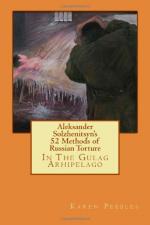|
This section contains 4,816 words (approx. 17 pages at 300 words per page) |

|
SOURCE: "Solzhenitsyn and Leskov," in Russian Literature Triquarterly, No. 6, Spring, 1973, pp. 478-89.
In the following essay, Lottridge associates Solzhenitsyn's "Matryona's Home" and "Zakhar-the-Pouch" ("Zahar-Kalita") with nineteenth-century Russian writer Nikolai Leskov's "well-known series of stories about righteous men."
This article will deal with Alexander Solzhenitsyn's short stories—especially, though not exclusively, with "Matryona's House" and "Zahar-Kalita"—in relation to the works of one of Solzhenitsyn's most important literary predecessors, the great storyteller of Russian literature, Nikolai Leskov.1 The possibility of a connection between Solzhenitsyn and Leskov is suggested most specifically by the conclusion of "Matryona's House":
We all lived close to her and we didn't understand that she was that very righteous person without whom, according to the proverb, no village stands.
Nor city.
Nor our whole land.2
The proverb mentioned here appears, in a slightly different form, as the epigraph to Leskov's well-known series of stories about righteous...
|
This section contains 4,816 words (approx. 17 pages at 300 words per page) |

|


